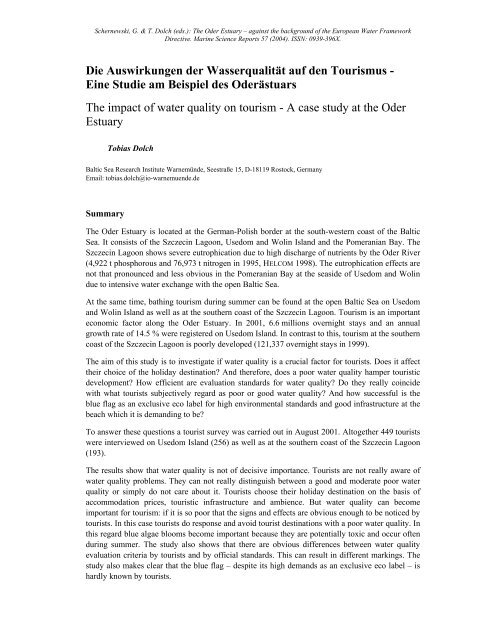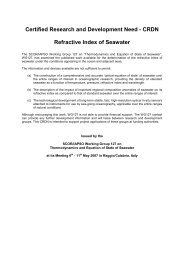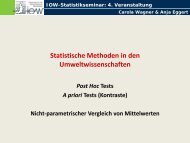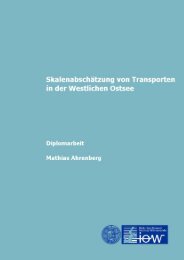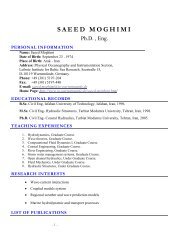The Oder Estuary - IOW
The Oder Estuary - IOW
The Oder Estuary - IOW
Sie wollen auch ein ePaper? Erhöhen Sie die Reichweite Ihrer Titel.
YUMPU macht aus Druck-PDFs automatisch weboptimierte ePaper, die Google liebt.
Schernewski, G. & T. Dolch (eds.): <strong>The</strong> <strong>Oder</strong> <strong>Estuary</strong> – against the background of the European Water Framework<br />
Directive. Marine Science Reports 57 (2004). ISSN: 0939-396X.<br />
Die Auswirkungen der Wasserqualität auf den Tourismus -<br />
Eine Studie am Beispiel des <strong>Oder</strong>ästuars<br />
<strong>The</strong> impact of water quality on tourism - A case study at the <strong>Oder</strong><br />
<strong>Estuary</strong><br />
Tobias Dolch<br />
Baltic Sea Research Institute Warnemünde, Seestraße 15, D-18119 Rostock, Germany<br />
Email: tobias.dolch@io-warnemuende.de<br />
Summary<br />
<strong>The</strong> <strong>Oder</strong> <strong>Estuary</strong> is located at the German-Polish border at the south-western coast of the Baltic<br />
Sea. It consists of the Szczecin Lagoon, Usedom and Wolin Island and the Pomeranian Bay. <strong>The</strong><br />
Szczecin Lagoon shows severe eutrophication due to high discharge of nutrients by the <strong>Oder</strong> River<br />
(4,922 t phosphorous and 76,973 t nitrogen in 1995, HELCOM 1998). <strong>The</strong> eutrophication effects are<br />
not that pronounced and less obvious in the Pomeranian Bay at the seaside of Usedom and Wolin<br />
due to intensive water exchange with the open Baltic Sea.<br />
At the same time, bathing tourism during summer can be found at the open Baltic Sea on Usedom<br />
and Wolin Island as well as at the southern coast of the Szczecin Lagoon. Tourism is an important<br />
economic factor along the <strong>Oder</strong> <strong>Estuary</strong>. In 2001, 6.6 millions overnight stays and an annual<br />
growth rate of 14.5 % were registered on Usedom Island. In contrast to this, tourism at the southern<br />
coast of the Szczecin Lagoon is poorly developed (121,337 overnight stays in 1999).<br />
<strong>The</strong> aim of this study is to investigate if water quality is a crucial factor for tourists. Does it affect<br />
their choice of the holiday destination? And therefore, does a poor water quality hamper touristic<br />
development? How efficient are evaluation standards for water quality? Do they really coincide<br />
with what tourists subjectively regard as poor or good water quality? And how successful is the<br />
blue flag as an exclusive eco label for high environmental standards and good infrastructure at the<br />
beach which it is demanding to be?<br />
To answer these questions a tourist survey was carried out in August 2001. Altogether 449 tourists<br />
were interviewed on Usedom Island (256) as well as at the southern coast of the Szczecin Lagoon<br />
(193).<br />
<strong>The</strong> results show that water quality is not of decisive importance. Tourists are not really aware of<br />
water quality problems. <strong>The</strong>y can not really distinguish between a good and moderate poor water<br />
quality or simply do not care about it. Tourists choose their holiday destination on the basis of<br />
accommodation prices, touristic infrastructure and ambience. But water quality can become<br />
important for tourism: if it is so poor that the signs and effects are obvious enough to be noticed by<br />
tourists. In this case tourists do response and avoid tourist destinations with a poor water quality. In<br />
this regard blue algae blooms become important because they are potentially toxic and occur often<br />
during summer. <strong>The</strong> study also shows that there are obvious differences between water quality<br />
evaluation criteria by tourists and by official standards. This can result in different markings. <strong>The</strong><br />
study also makes clear that the blue flag – despite its high demands as an exclusive eco label – is<br />
hardly known by tourists.


